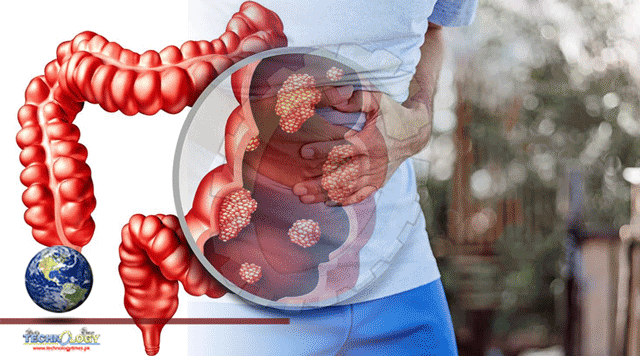There is a key combination of symptoms to watch out for when it comes to bowel cancer. According to the NHS, they affect “more than 90 percent” of people who have the condition.

There is a key combination of symptoms to watch out for when it comes to bowel cancer. According to the NHS, they affect “more than 90 percent” of people who have the condition. The symptoms can be “subtle”, especially as you may not feel ill when you experience them, but if you notice the following combination, a doctor check-up can be helpful. One of the symptoms of bowel cancer is “a persistent change in bowel habit”.
This may include releasing yourself more often, in terms of faeces, with poo being “looser” and “runnier”, sometimes alongside tummy pain.
When this symptom is accompanied by blood in the faeces, it could be a warning sign.
As haemorrhoids can cause blood to pool in the toilet bowl, you would want to determine whether you do have haemorrhoids or not.
Haemorrhoids (otherwise known as piles) are “lumps inside and around your bottom (anus)”.
The indications of piles include:
- An itchy anus
- Pain around the anus
- Lumps around the anus
- Slimy mucus on the toilet paper after wiping
- Feeling like you need to poo after going to the toilet.
If you do have piles, a pharmacist can offer treatment options, such as cream to ease the itching and pain.
Pharmacists can also offer solutions to ease constipation that may be accompanied with piles.
Reassuringly, the NHS certified that passing harder stools (constipation) is “rarely caused by serious bowel conditions”.
As such, if you are suffering from bouts of constipation, it is less likely to be bowel cancer.
Constipation can be caused by not eating enough fibre, not drinking enough fluids, or not moving around enough.
Should you experience a persistent change in bowel habits (that is runnier, looser stools), or blood in your faeces (that is not attributed to piles), beware of the following sign.
Any abdominal pain, discomfort or bloating that is “always brought on by eating” could be a sign of bowel cancer.
If you experience a change in bowel habits, blood in stools, or stomach aches after eating for three weeks or more, book a doctor’s appointment.
Remember, the sooner bowel cancer is diagnosed, the better the chances of a full recovery.
It is not spoken about enough, but a cancer diagnosis can trigger a range of emotions.
From shock, anxiety, relief, sadness, and fear, whatever feelings arise – or don’t arise – is completely normal.
Delving into the emotional side of a cancer diagnosis, Macmillan Cancer Support emphasised: “There is no right or wrong way to feel.”